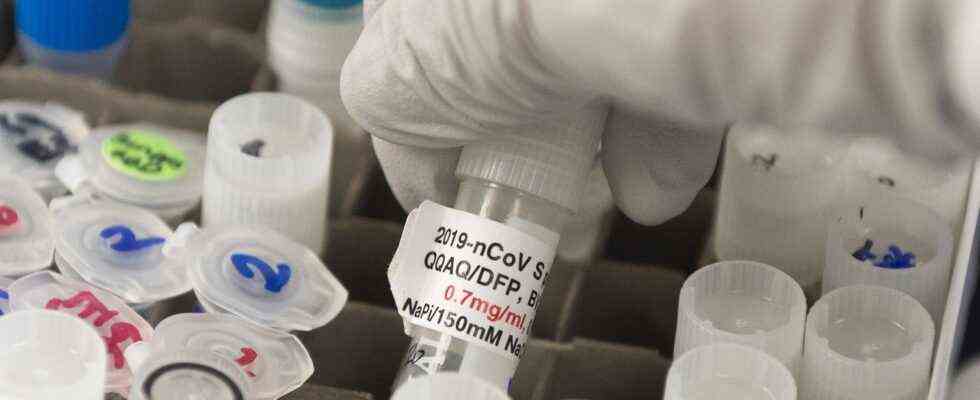analysis
Status: 07/12/2021 3:24 p.m.
Sanofi is one of the world’s largest vaccine manufacturers. But the French pharmaceutical company has lagged behind in the fight against the corona virus. Why is that?
By Susanne Kathrin Wildhagen,
ARD studio Paris
At the beginning of July this year, the time had finally come: Sanofi announced that the Covid-19 vaccine developed together with its British partner GSK would come onto the market in December 2021 – a year later than the vaccine from BioNTech / Pfizer.
Too late? Olivier Bogillot, France boss of the group, is optimistic about the French media: “With the spread of the Delta variant, a vaccination booster will certainly be necessary. In addition, only 20 percent of the world population is vaccinated.” During its development, the preparation was tested for the Wuhan parent virus and the beta variant from South Africa. It shows a very high level of effectiveness. It will first have to prove itself against the newer variants.
Instead of own success, help for the competition
Sanofi is the pharmaceutical company with the highest sales in the European Union and one of the largest vaccine manufacturers worldwide. France has high hopes for the company in the fight against SARS-CoV-2. A pre-order of 300 million cans was negotiated with the European Commission at the end of 2020.
The vaccine, which is being developed using classic protein-based technology, should actually be commercialized at the beginning of the year. There are still delays due to technical errors; the preparation is less efficient than expected. Instead of taking a pioneering role, Sanofi is lagging behind and helping its competitors BioNTech / Pfizer with the bottling of their extremely successful mRNA vaccine, which is based on a novel technology. To put it simply, it no longer receives finished components of the pathogen, but the construction plans.
The pharmaceutical giant Sanofi, once the pride of the French economy, has suffered considerable damage to its image. The French business magazine “Challenges” speaks of a fiasco and asks itself how this could happen in the country of vaccination pioneer Louis Pasteur of all places. Sanofi unionist Thierry Bodin sees it similarly: “This was a disaster for the employees too, we had the impression that we at Sanofi are the losers.”
Clumsy, hesitant and not very visionary
For health economist Frédéric Bizard, Sanofi’s delay in the race for the vaccine shed light on massive problems in the company’s strategy. “The company lacks a vision. Sanofi is like a giant tanker that is very clumsy to maneuver.”
The company was founded in 1973 as a subsidiary of the Elf oil company. At that time, Sanofi produced seeds and cosmetics in addition to pharmaceuticals. In 2004, Sanofi merged with the Franco-German competitor Aventis and became the third largest pharmaceutical company in the world at the time.
Concentration on profitable lines of business
Sanofi’s priority is to position itself as profitably as possible in the market. The group is withdrawing from declining areas – such as research on Alzheimer’s, Parkinson’s and diabetes – and focuses on the profitable areas of oncology, immunology and vaccine development.
The company strategy is not very risk-taking. This is one of the reasons why the group primarily relies on classic technology that has already been tried and tested through the flu vaccine when developing Covid-19 vaccines. Sanofi is also working with the American biotech company Translate Bio on a new type of mRNA vaccine; However, there is still no precise schedule for a possible commercialization.
Does restructuring endanger success?
Not only the missed goal in the race against the corona virus is causing problems for the pharmaceutical company’s image. Sanofi has been in the headlines for many months due to constant job cuts. Because the lack of willingness to take risks and the frequent restructuring also result in regular social plans. Since 2008, the group has cut 2,500 positions in research and development, and most recently 364 further job cuts were announced by 2022. And that although the company is financially in the best of health. In 2020 alone, he brought in a net profit of 12.3 billion euros.
“Due to the unclear course and the ongoing restructuring, we have lost expertise. This also has an impact on quality control,” said trade unionist Bodin. The delay in vaccine development against the coronavirus can be attributed to incorrectly dosed antigens, which reduced its effectiveness. The vaccine had to be reassembled and the test phases had to start over. That shouldn’t happen to a vaccine development veteran like Sanofi.
Lots of bureaucracy, few incentives
In addition, according to economist Bizard, the company is located in a difficult environment. “In France, too little is invested in research and development, and the country is organized far too bureaucratically. Clinical studies, for example, are subject to very lengthy deadlines, which is why they had to be carried out in the United States when the Covid 19 vaccine was developed.”
In France, the promotion of private-sector research and development is largely granted automatically through tax credits and is therefore not very targeted. The salaries of French researchers are around 63 percent below the OECD average, and public funding for basic research fell by more than a quarter between 2011 and 2018.
Back to the top with mRNA?
Following the failure of the French corona vaccine, President Emmanuel Macron has announced a multi-billion dollar investment plan for research and development. And Sanofi is also giving full throttle. A few weeks ago, the company announced that it would be investing heavily in the development of mRNA-based vaccines. A total of two billion euros is to flow into the development of six new vaccine candidates by 2025. After all, mRNA technology has proven itself in the pandemic. If this succeeds, Sanofi and thus also France could soon be at the forefront again – albeit perhaps a bit clumsy.

